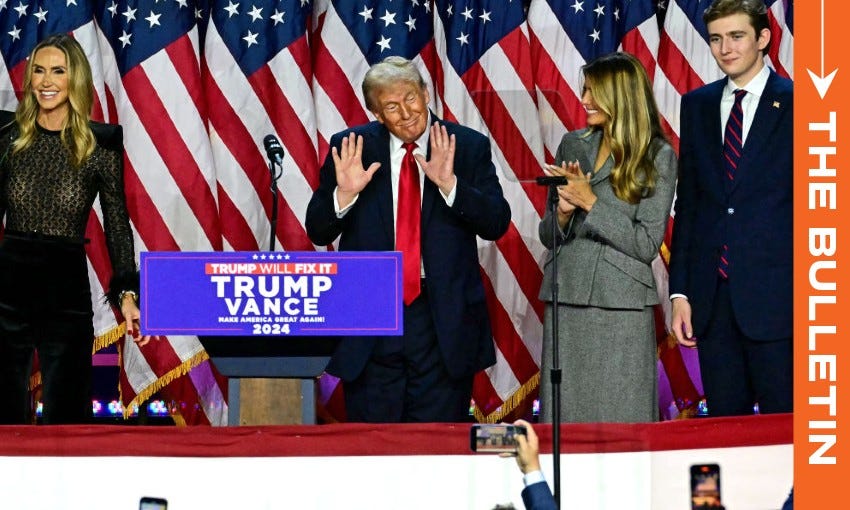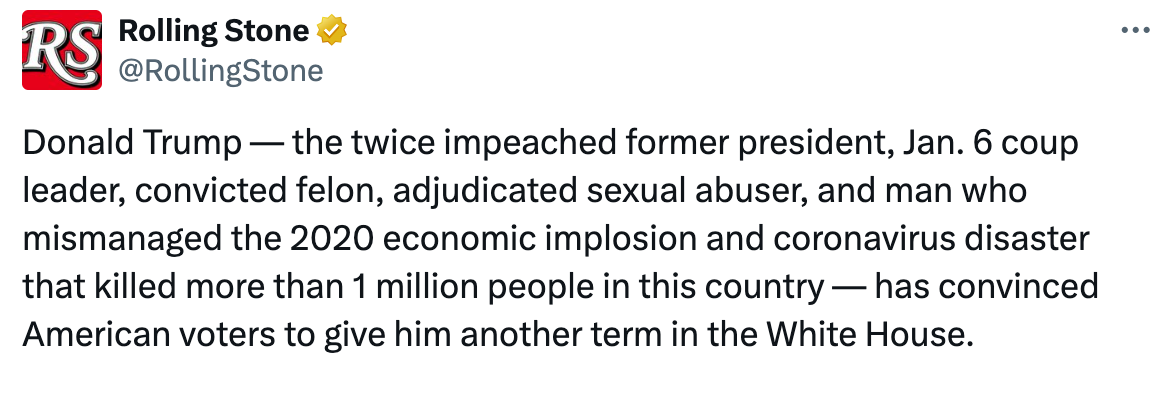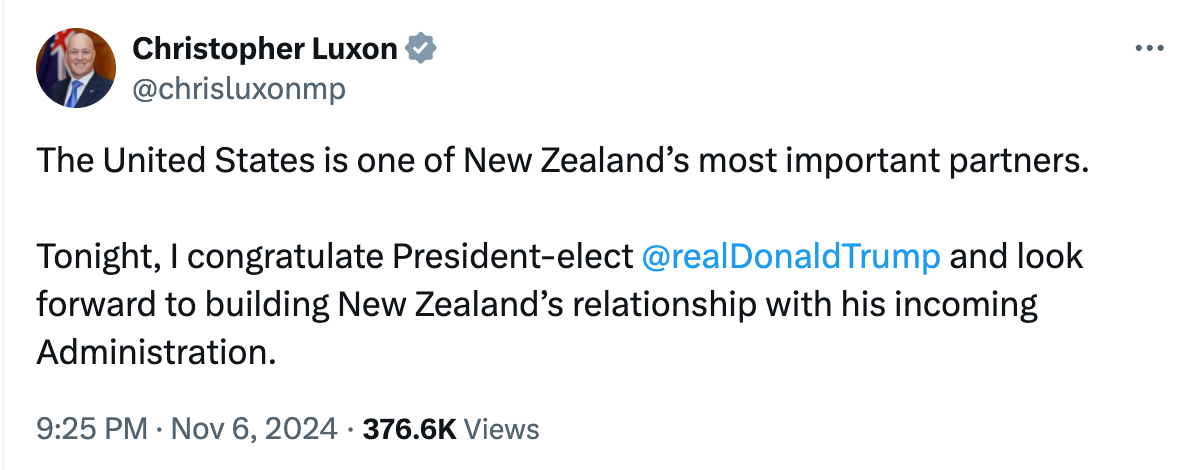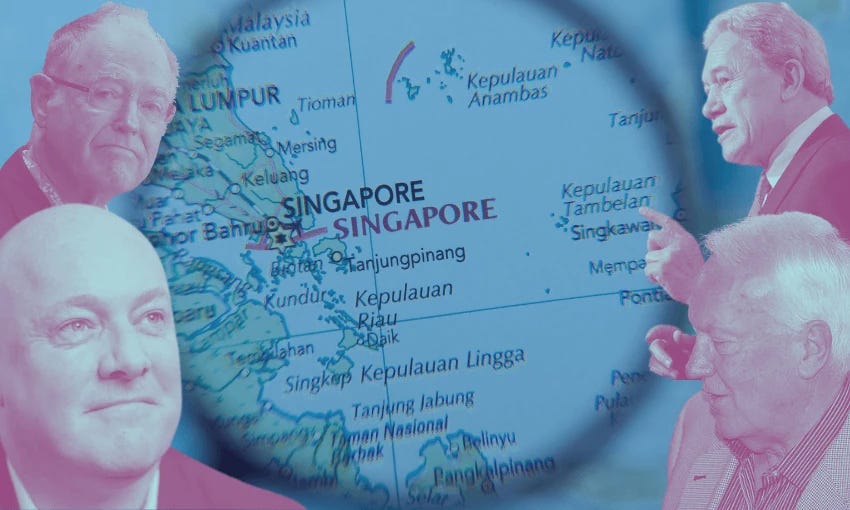The morning after the night before: Trump returns to the White House
The 45th president will become the 47th, with Republicans winning the Senate and on track to control the House too.
Mōrena, and welcome to The Bulletin for Thursday, November 7.
In today’s edition: We can expect to get our first glimpse at the final wording of the controversial Treaty Principles Bill later today, New Zealand’s unemployment rate has hit 4.8%, and Joel MacManus continues his very long commute. But first, in a slightly longer than usual edition of The Bulletin, we debrief on an historic and surprising US presidential election night.

A political comeback like no other
The race was predicted to be tight, but in the end it wasn’t really. Former president Donald Trump will return to the White House, comfortably, with the latest projections reporting Trump has secured over the required 270 Electoral College votes and is leading in several key states yet to be called. It puts him on track to pull in a result bigger than Joe Biden’s in 2020 and, in contrast to his 2016 win, he will also take the popular vote. At the time of writing, the Republicans have also secured the Senate while the House of Representatives is still up for grabs. It’s a remarkable comeback story for Trump, who left the presidency in 2021 in a violent cloud as supporters stormed the Capitol, and has spent much of the past three years in and out of court. ABC’s live election coverage repeatedly emphasised that the election would be historic – the choice between the first female president or the first president that had been convicted of a crime. Here’s how Rolling Stone magazine summarised it in a tweet.
Writing for The Post, Luke Malpass said the past four years of Joe Biden now looked like a “Covid-era aberration”, with Trump improving his performance in virtually every state counted so far. “America has moved to the right,” said Malpass. “The result reveals two Americas, divided along cultural lines. The prosperous, mostly coastal cities, rich with economic opportunity and the beneficiaries of globalisation and the parts of the country left behind by that prosperity and the cultural change it has wrought.”
How Harris became linked to Biden’s failures
The mood at the Harris camp was understandably sober. The vice president did not address supporters gathered on election night, reported the Herald’s Thomas Coughlan, though it’s intended she will do so today. It’s now being reported that Harris will speak at 10am NZT, earlier than initially expected.
In analysis for ABC shared here by RNZ, Leigh Sales laid out six reasons why Harris was always on track to lose last night’s election. Among them, the state of the US economy. While Harris was not the president over the past four years, she has been inextricably linked to it as veep – and the Trump campaign did its best to blame her for the actions of the wider administration. Sales noted that while the economy has improved under the Biden administration, Americans “feel like they’re doing it tougher than they ever have”. That so-called “vibecession” has been felt around the world. New Zealand has, to some extent, experienced it too – while we have dipped in and out of recession, many feel we’ve been stuck in one for a lot longer.
The signs of this were apparent as soon as the early polls emerged yesterday, reported AP. While Harris voters were motivated by the fate of democracy, Trump backers were most worried about immigration and inflation. At the end of the day, that messaging won out.
The immediate ramifications
Former prime minister John Key, who publicly backed Trump, tempered his messaging slightly in an interview with Newstalk ZB’s Ryan Bridge this morning. On the prospect of Trump introducing heavy tariffs on foreign goods, Key acknowledged there would be “quite big repercussions” for New Zealand. "There is some downside for New Zealand and I'm not going to sugarcoat that, and they concern me."
The New Zealand dollar took an immediate hit, the Herald’s Jamie Gray reported (paywalled), dipping by about US1c while local wholesale interest rates spiked. In an interview with RNZ’s Lisa Owen last night, Tim Groser, the former NZ ambassador to the US during the first Trump term, warned Americans that they may find their cost of living increases as a result of the incoming president’s proposed tariffs. “All of the responsible economists… are saying this is a disaster… The estimate is this will add between $2,000 and $4,000 to the average American household’s bill a year. They’re going to find this out the hard, bloody way.”
How the world reacted
World leaders, including prime minister Christopher Luxon, have congratulated Trump on his election victory. Many sent out statements before some of the major US news networks had called the election for the Republican candidate, but after Trump had claimed victory himself. The BBC reported that Israeli PM Benjamin Netanyahu, who had a troubled relationship with outgoing president Joe Biden, was among the first to share his congratulations, along with UK leader Keir Starmer.
Ukraine’s president Volodymyr Zelensky said he appreciated Trump’s commitment to the “peace through strength” approach in global affairs. “This is exactly the principle that can practically bring just peace in Ukraine closer."
Matthew Hooton, in a column for the Herald (paywalled), noted that the world was entering its most dangerous period since World War II – but argued the US was entering its most dangerous time since the Civil War. “Trump [is] threatening to abandon Ukraine, withdraw the US’s security in Europe which will encourage Russia’s Vladimir Putin to expand his ambitions westward, launch a global trade war and collapse the World Trade Organisation.”
An election like no other
To finish, a brief reflection on what has been a long and exhausting election campaign. Until 100-ish days ago, it was meant to be Joe Biden facing up against Trump last night. We all remember the disastrous debate performance that ultimately triggered his decision to leave the race, paving the way, he believed, for a new generation of political leaders (and search data suggests a lot of people didn’t realise he had quit the race until this week, somehow). The Spinoff’s Toby Manhire noted the Jacinda Ardern-esque glimmers in the sudden ascension of Harris – an anti-Trump figure that could unify America.
The New Yorker has wrapped 25 “stunning moments” from this year’s election campaign that it claims “fell out of a coconut tree”. From the end of the Biden campaign, to a failed assassination attempt on Trump, to claims that the people of Springfield were “eating the pets” – it’s been a long ride. Now, the world prepares for whatever comes next.
The Spinoff Members is a community dedicated to supporting quality, homegrown journalism
From our newsletters and podcasts, to our coverage of te ao Māori and political reporting – the support of readers like you makes this work possible. If you can, please consider making a contribution today.
Treaty Principles Bill to reach parliament today
We can expect to get our first glimpse at the final wording of the controversial Treaty Principles Bill later today as it is introduced to parliament. It was previously expected the bill would be launched next week, when Christopher Luxon would be out of the country for an Apec summit. As Julia Gabel reported for the Herald, the decision to bring forward the date had blindsided opponents – such as Te Pāti Māori – though the bill’s architect denied there was any tactical reasons at play. “You were always changing dates with stuff around parliament,” he said. “The only reason this is getting attention is because the Waitangi Tribunal has insisted on knowing every date almost in real time. They asked for a date, we gave them a date, and the date changed.”
The date change means some of the coverage of the bill has been lost amid the US presidential elections – and it will now be launched ahead of a planned hīkoi to parliament. Undoubtedly, we’ll be talking more about all of this in the coming days.
Unemployment up, but better than predicted
New Zealand’s unemployment rate has hit 4.8%, reports Dan Brunskill at Interest, the highest it has been since December 2020 but slightly below Reserve Bank expectations. The central bank had predicted the jobless rate to reach 5%, up from 4.6% in the previous quarter. It hasn’t tempered projections that interest rates will continue to be cut, writes BusinessDesk’s Rebecca Howard (paywalled). Bank economists are still picking a 50 basis point cut to the Official Cash Rate later this month, though ANZ said that the chances of an even larger 75 point cut were now slim.
Catch up on The Spinoff’s Travel Week
Hera Lindsay Bird recounts her greatest trip: an awkward high-school exchange to Germany.
Charlotte Doyle asks whether we can we redeem the classic OE.
Joel MacManus heads into day four of his long commute. Will his second ferry be as bad as the first?
Click and Collect
Aucklanders are being warned of possible disruptions from several protests slated for next week when vehicle convoys are planned to take over the city’s motorway network.
Legal challenges to new Wellington tunnels already promised.
In a paywalled report for BusinessDesk subscribers, Pattrick Smellie asks the simple question: What is the point of the banking inquiry?
First-home buyers are paying less and probably getting bigger houses this year than their counterparts in recent years have been able to buy.
The Post’s Julie Jacobson reports on a meeting about the future of Wellington’s Civic Square that started subdued but ended up with “betrayal, misinformation [and] lies”.
Something I’d like to talk about more in-depth for a future Bulletin is New Zealand’s forthcoming anti-stalking legislation. We don’t know a lot yet, but 1News’ Anna Murray explains what is on the table and why it has been called for.
The rightwing enthusiasm for authoritarian Singapore illustrates the extent to which, on one crucial point at least, New Zealand’s hands-off approach to the economy has failed, argues Max Rashbrooke. Spinoff writers (and their pets) review RNZ Concert’s Guy Fawkes programme. Sonya Wilson, author and founder and executive director of Kiwi Christmas Books, heads into The Spinoff Books Confessional.
That’s it for today, thanks for reading. See you back here tomorrow morning.
Want to get in touch? Join the conversation in the Substack comments section below or via email at thebulletin@thespinoff.co.nz if you have any feedback on today’s top stories (or anything else in the news).
If you liked what you read today, share The Bulletin with friends, family and colleagues.
















With Republican control of the Senate my understanding is that any vacancies in the next 4 years will be filled by conservative appointees of the ilk that decided that any actions of the president were above the law; and changed the abortion law. Personally I think this is one of the most terrifying consequences of this election outcome.
Disgusted at the fawning by our PM and deputy. This is going to have grave consequences for the world. Interesting the gender lines at play in the voting.